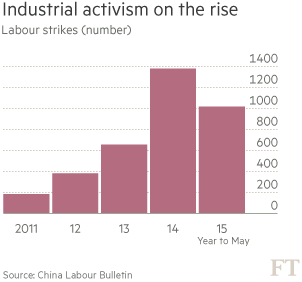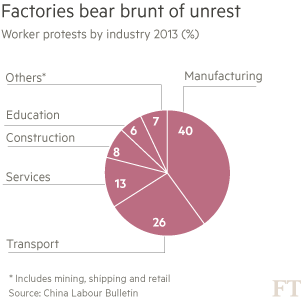Deutsche Bank’s executive shake-up, Erdogan’s poll blow, solar panel theft


Get involved with our crowdsourced digital platform to deliver impact at scale
Stay up to date:
Corruption
The daily briefing “FirstFT” from the Financial Times.
Deutsche Bank’s co-chief executives Anshu Jain and Jürgen Fitschen became the latest heads to roll at top banks, which since the financial crisis have been hit by tougher regulation, sluggish markets and a string of fines over misconduct.
Mr Jain’s ascent was easier than his time at the top of the bank, which was marked by turbulence. He and Mr Fitschen follow their counterparts at Credit Suisse and Standard Chartered out the door, just a month after the bank unveiled a strategy to bolster shareholder returns, which were just 2.7 per cent in 2014.
Lex says shareholders simply lost patience . All eyes are now on the new chief executive, John Cryan, a 54-year-old Briton with a reputation for being ruthlessly efficient. (FT)
In the news:
Erdogan poll blow
Turkey’s Islamist-rooted AK party appeared to have lost its parliamentary majority after 13 years in power. While President Recep Tayyip Erdogan still towers over all rivals, writes David Gardner, the halo has slipped – Turks have said no to his vaulting personal ambition. (FT)
Juncker warns Greece
The European Commission president has a simple message for Athens after it rejected a new bailout offer as “absurd”: bailouts don’t grow on trees. With Greece believed not to have enough money to pay a EUR1.5bn IMF bill at the end of the month, the two sides must reach an agreement soon but, Mr Juncker said, Greek Prime Minister Alexis Tsipras “must observe some minimal rules”. (FT)
South China Sea drama
The US is struggling to form a strategy to deal with Beijing’s land reclamation spree in the contested area, which has seen China spew out 2,000 acres of land in just 18 months, far outstripping all other claimants combined. (FT)
Middle Eastern funds fear decline
More than a third of Middle Eastern sovereign wealth funds expect new funding to decrease as the region adjusts to a period of lower oil prices, according to an Invesco survey. The flipside is that the outlook for regional funds is quite positive as their governments seek long-term returns or domestic development. (FT)
Russia and Qatar could be stripped
The 2018 and 2022 World Cups could be taken from the two countries if evidence emerges of bribery in the bidding process, Domenico Scala, independent chairman of Fifa’s audit and compliance committee, told a Swiss newspaper. (Reuters)
Chinese hackers mapping US government
Experts are warning that the people behind the breach of US federal workers’ data may be trying to recruit spies and access networks in other departments. Up to 4m current and former federal employees may have been affected by the cyber attack. (FT)
Solar panel theft rises
It took two weeks for Matthias Kynast to discover thieves had struck the solar park he manages near the German town of Arnsberg, when hikers reported a fence had been cut down. The criminals that day made off with about 250 solar panels, and although they made up only a fraction of the 10,500 panels installed at the rural site, the bill came to about EUR50,000. (FT)
Regulation not so sweet
Chocoholics, you’ve been warned: Mars, the confectionery company, has joined the world’s largest oil traders to oppose European financial market rules they argue would increase volatility in raw materials markets. Meanwhile, Japanese consumersface higher chocolate prices as the weak yen drives up the cost of cocoa imports. (FT)
It’s a big day for:
G7
A peace deal for Ukraine and Greece’s ongoing bailout and financing drama have been top of the agenda for leaders from the Group of Seven countries, who conclude a two-day summittoday at Schloss Elmau in Germany. Over the weekend, protesters marched in a nearby town, and blocked the main road to the Apline luxury resort where the leaders were meeting. (Reuters, FT)
Apple
The tech group brings together its software partners for an annual conference dedicated to the future of the iOS and OS X operating systems. Here’s what to expect(including the new streaming service). (Engadget, FT)
Food for thought:
FT Series: End of China’s migrant miracle
The toil and trouble of China’s working class, where labour shortages give workers a stronger hand but scepticism about the justice system remains widespread. A look at growing labour unrest in the Middle Kingdom. (FT)
US AIIB snub a mistake
Robert Zoellick, former World Bank president and US Trade Representative, has become the second high-profile US policy maker in less than a week to label the negative response to China’s proposed Asian Infrastructure Investment Bank a mistake. “Though some Chinese moves might be destabilising and require US resistance, this initiative should have been welcomed,” he writes. (FT)
Serena’s grand slam?
Stanislas Wawrinka’s French Open victory on Sunday halted Novak Djokovic’s bid for a career grand slam – winning all four major tennis tournaments. It ended Djokovic’s chances of winning all the major titles in a calendar year. But Serena Williams’ win on Saturday (her 20th grand slam singles title) keeps her in the hunt for one of the most elusive feats in sport. (FT, WSJ)
The Moocs will inherit the earth
The co-founder of Coursera talks about the advantages oflearning online – and why traditional universities aren’t going anywhere. (WSJ)
Mothers of invention
Parul Sehgal explores a group of authors who are finding new narrative possibilities in parenthood. “Many of these books adopt a copious, fragmentary form and gesture, some a bit shyly, toward radical possibilities for the domestic. On canvas big and small, they test out new answers to ancient questions: How best can we live this life and how best can we write about it, to what ends and with what compromises?” (Bookforum)
Video of the day:
Bond turmoil
Volatility has returned to the global markets with yields sharply higher. John Authers takes a look at the week and suggests that the strong US labour report will put more upward pressure on yields. (FT)
This article is published in collaboration with The Financial Times. Publication does not imply endorsement of views by the World Economic Forum.
To keep up with the Agenda subscribe to our weekly newsletter.
Author: FirstFT is the Financial Times’ editors curated free daily email of the top global stories from the FT and the best of the rest of the web.
Image: A man walks past buildings at the central business district of Singapore. REUTERS/Nicky Loh.
Don't miss any update on this topic
Create a free account and access your personalized content collection with our latest publications and analyses.
License and Republishing
World Economic Forum articles may be republished in accordance with the Creative Commons Attribution-NonCommercial-NoDerivatives 4.0 International Public License, and in accordance with our Terms of Use.
The views expressed in this article are those of the author alone and not the World Economic Forum.
The Agenda Weekly
A weekly update of the most important issues driving the global agenda
You can unsubscribe at any time using the link in our emails. For more details, review our privacy policy.
More on Economic GrowthSee all
Andrea Willige
August 6, 2024
Omair Ansari and Manahil Javaid
August 6, 2024
Tarini Fernando and Nadia Shamsad
July 18, 2024
Naoko Tochibayashi and Mizuho Ota
July 17, 2024









